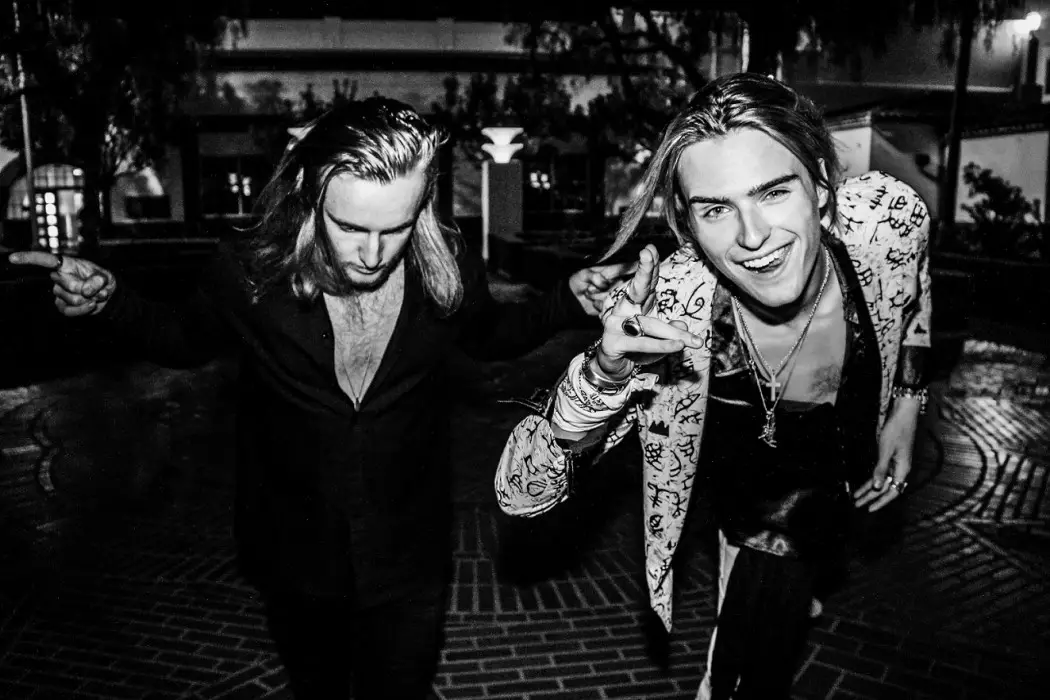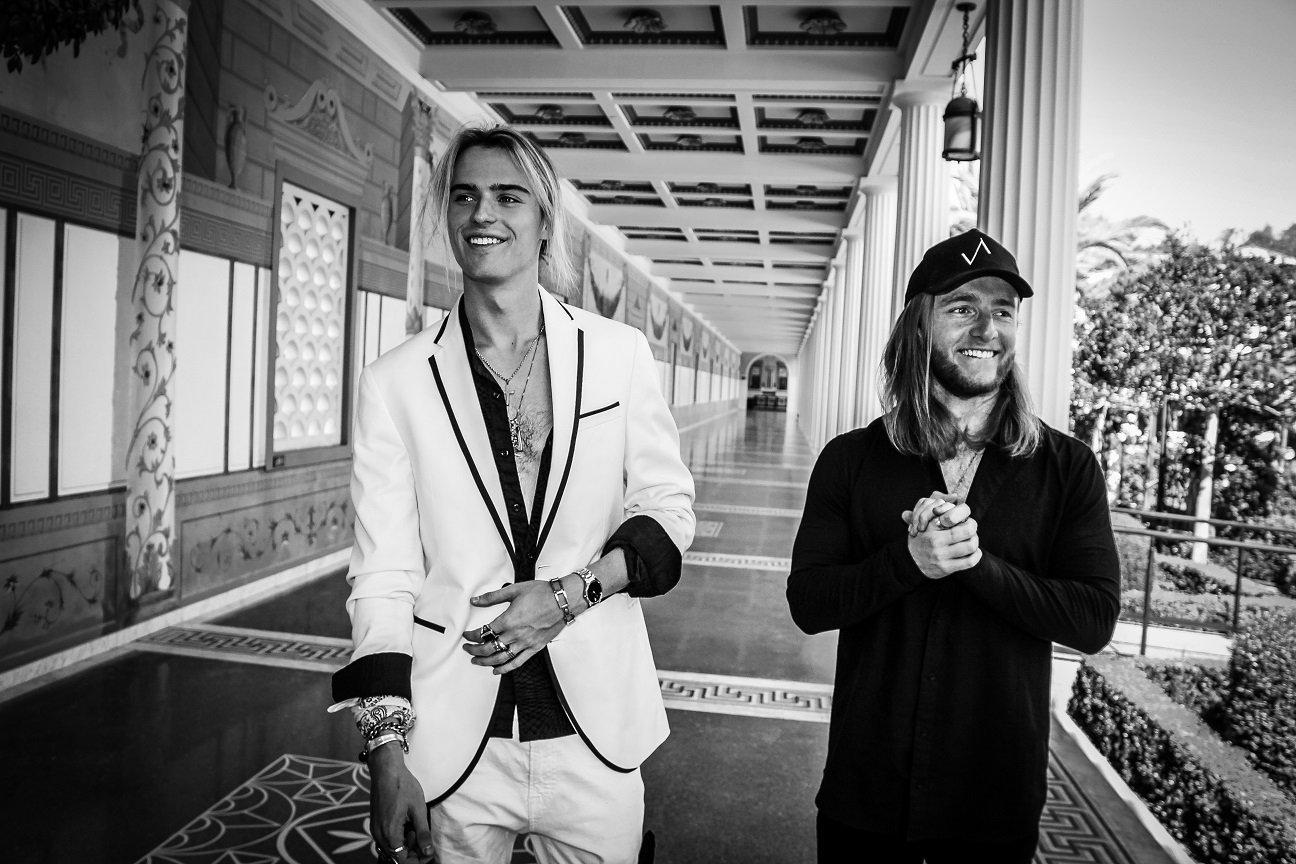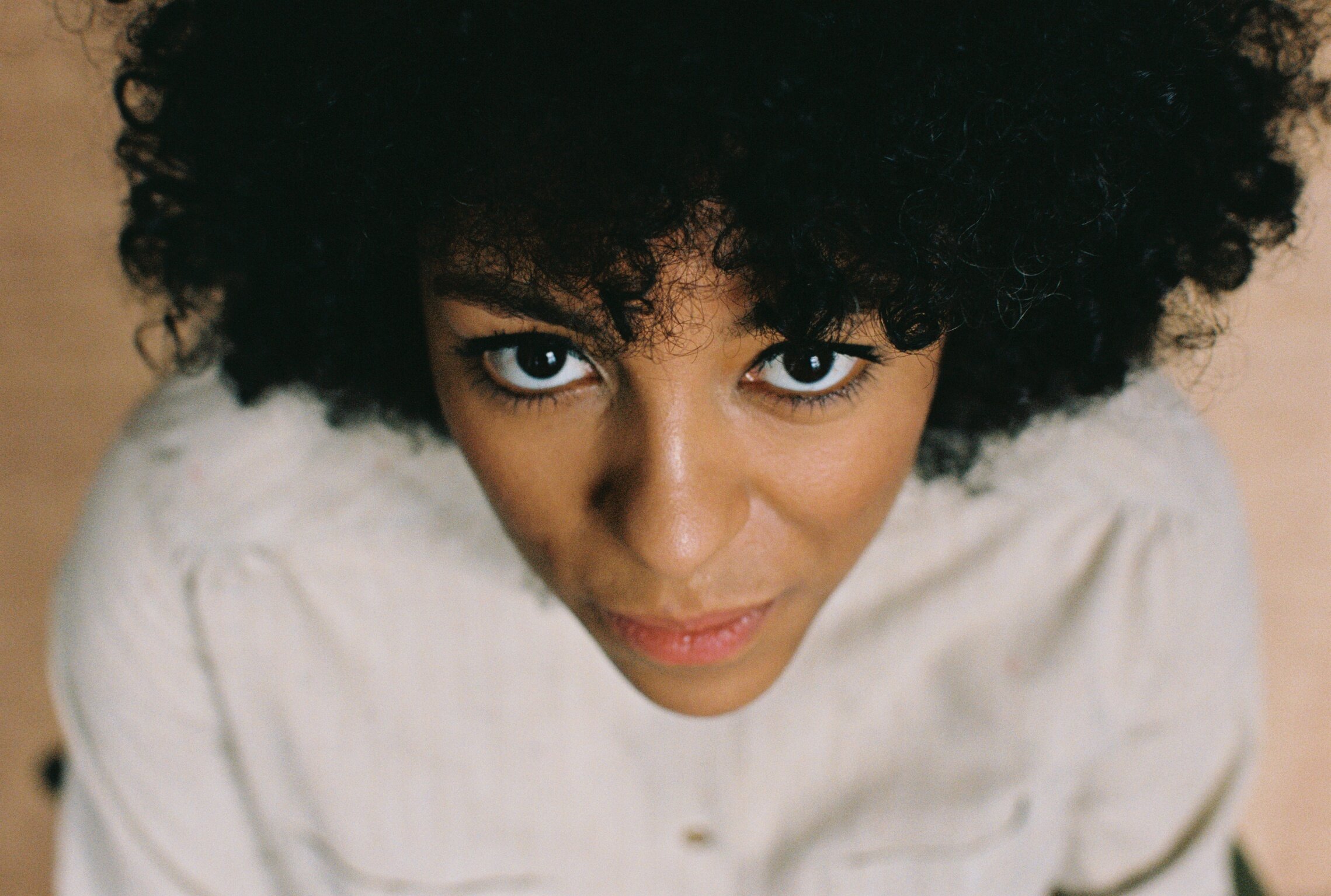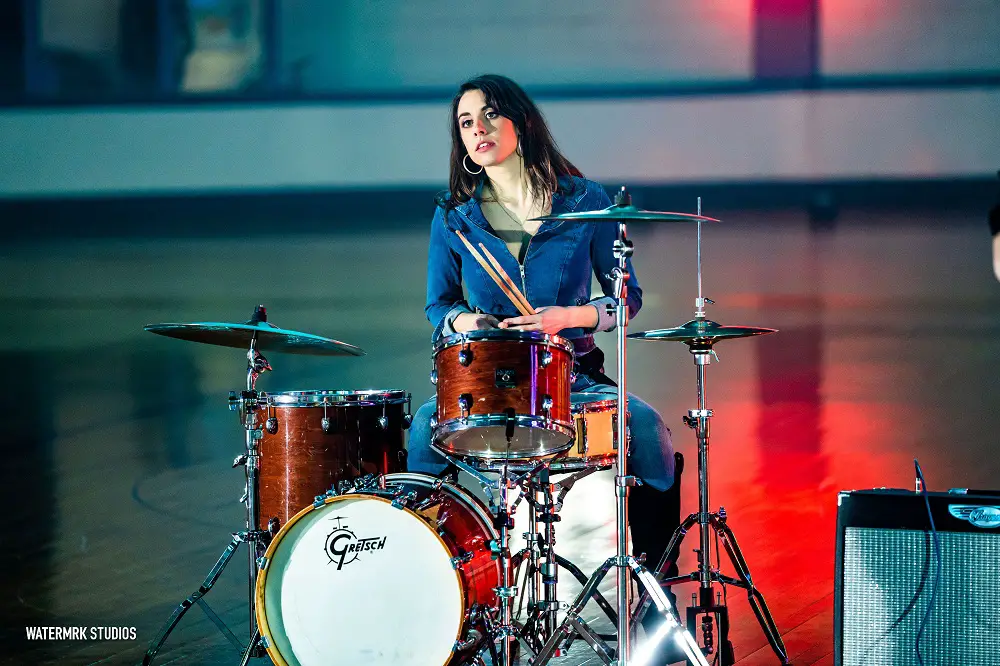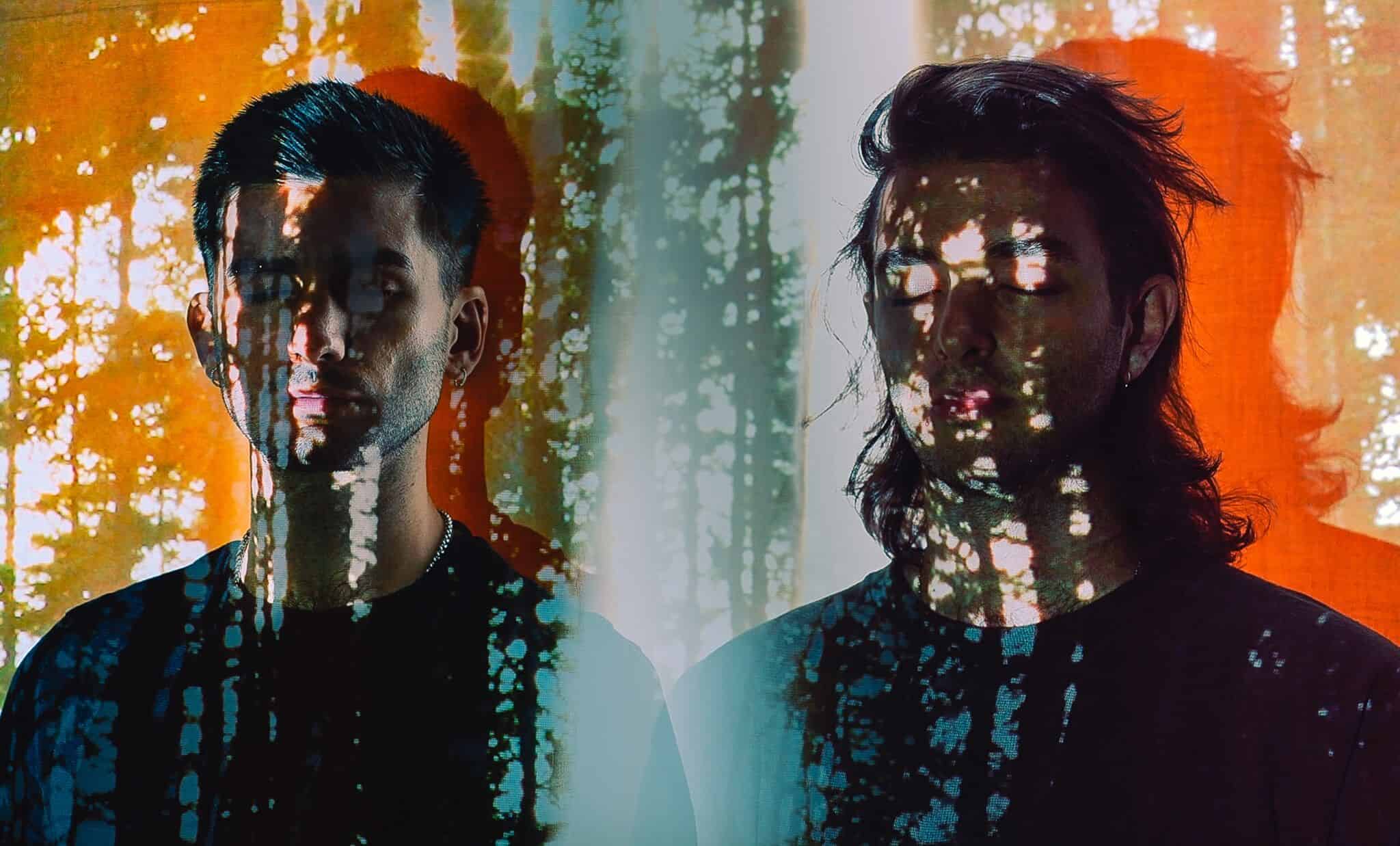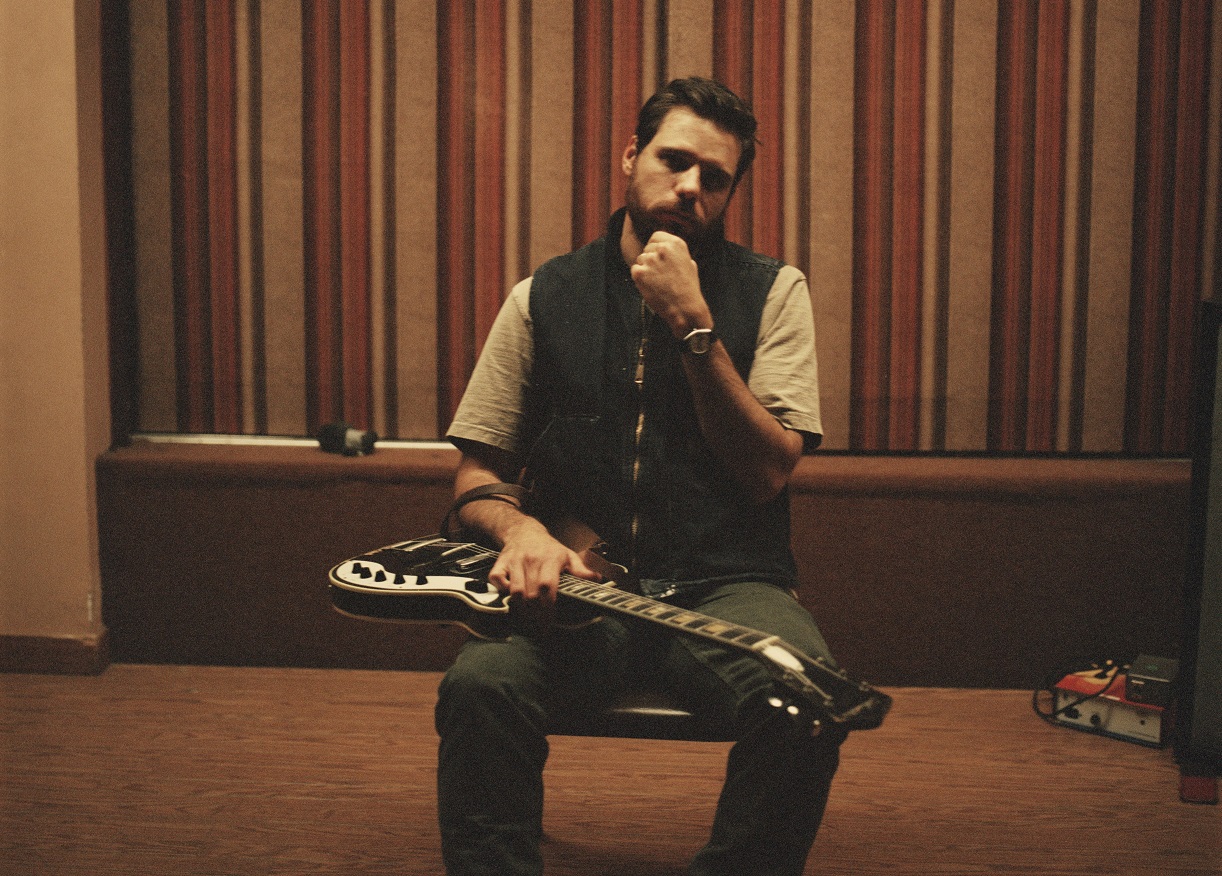From dance to indie-pop, contagious beats with deep messages introduce dynamic duo VOILÀ.
— — — —
From poetry to romance novels, the boys of VOILÀ are proud hopeless romantics, finding personal reflection and rehab in each love-lost lyric they write. Though raised on opposite sides of the world, Gus Ross and Luke Eisner are a dynamic pair of musicians, using their craft to express their deepest thoughts and encouraging listeners to do the same.
“We want to build an audience of people who wear their heart on their sleeve with the scars on it from where it was broken at one point,” said Eisner.
It’s in their lyrics that this hope is felt, revealing depth and wholesome heart. From dance production roots, the pair has channeled their romantic energy into a band format, one which allows the gravity of their lyrics to be heard in a context which echoes their past. Their releases are catchy but real; radio-ready, yet full of reflection.
Listen: “Hundredth Second Chance” – VOILÀ
The pair drew attention with first single “Lately,” with key line “You’ve been so distant lately” which plays into the concept of their first releases. Both “Lately” and “Hundredth Second Chance” speak of a relationship growing distant as the members try to hold onto the parts they once loved. It’s a heavy topic, both in heartbreak and relatability, bound to draw the exact audience VOILÀ wishes to attract. In message, tune, and appearance, the perfect formula has been created for a group of dedicated fans with a passion for love nearly as strong as the voices heading the movement.
The pair draws inspiration not only from real-life relationships, but site romance novels like Water for Elephants as fuel for their romantic views. It’s easy to hear the embrace of love in their work, but even more powerful is their vulnerability exploring all topics.
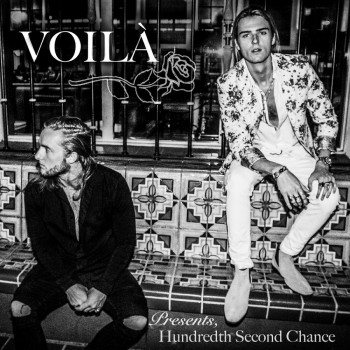
The unreleased “Stand Tall” is an ode to a father-son relationship, inspired by a friend’s lost father and Eisner’s own father’s cancer diagnosis. It’s a stripped-down track which encourages the listener to stay strong through the experience, whether it be a similar parental loss or a bout with depression. From trials with physical to mental health, both of which Ross and Eisner have experienced personally, VOILÀ promises to be candid and relatable. It’s a nearly perfect balance: from upbeat tracks to raw emotions, the band is breaking into a freshly-opened door in the pop market, one which encourages uplifting sounds and depth in message.
Eisner and Ross host a refreshing attitude, one lacking ego and embracing change. For an undeniably attractive pair of musicians, a different, masked approach, would be understandable. But instead of leading with looks or danceability, the pair has chosen to enter the music market with their hearts on their sleeves and their love of romance front and center. It’s a daring move, one that promises quick respect and flocks of fans who are bound to find the same feelings in each lyric that Ross and Eisner worked so tirelessly to preserve.
Atwood Magazine spoke with Ross and Eisner about their DJ days, hope for honesty and love of love. VOILÀ’s debut album, Ask Me Yesterday, is expected this spring.
A CONVERSATION WITH VOILÀ
Atwood Magazine: Can you guys just start by talking about your background? How long have you been writing music together and what got you into the industry?
Luke Eisner: So we both met here in LA at the University of Southern California, the school of music, and it’s funny cause I walked into class and, we both have long hair, and I wanted to sit next to the other guy with long hair. It happened to be Gus. That was a good call for me. And then we made some music. After that class we went into our rooms and put down a song right away. It was just a good fit.
Did you have similar music tastes? How did you figure out you were both into music?
Gus Ross: We hung out and we both like animatronic things. We bonded over bands like Fall Out Boy, that pop-punk sort of 2005 era. When I was back in England those sort of bands were really huge. We just found that we really connected over a lot of similar music and we would make songs and I would pitch up with an idea and Luke would pitch up with a very similar idea and we found that our tastes aligned like that and we just kept making music, making electronic music. We just got away at it. Now we’re finally at a point where our work is very synchronized because we’ve been here for a while. But it was an interesting one.
You mentioned that you guys started by making electronic music. What inspired the switch to more of a pop/indie angle?
Luke: I grew up in pop-punk bands throughout high school. Then I switched to doing dance music. My last few years in high school I was DJing and producing. Gus was doing the same thing. So I think it was so popular at that time that we kind of just jumped into that. But even when we were making dance music we were more song-oriented. Lyrics and melody were very important to us. Then we started tracking more stuff with a lot of vocal elements and I think we realized that trying to fit these songs into the dance realm was more of a hindrance than it would be to just be a band. Now that we’re in the format of being a band we’re able to fully express these ideas and tell the stories that we want to. I think the dance thing was holding us back a little bit.
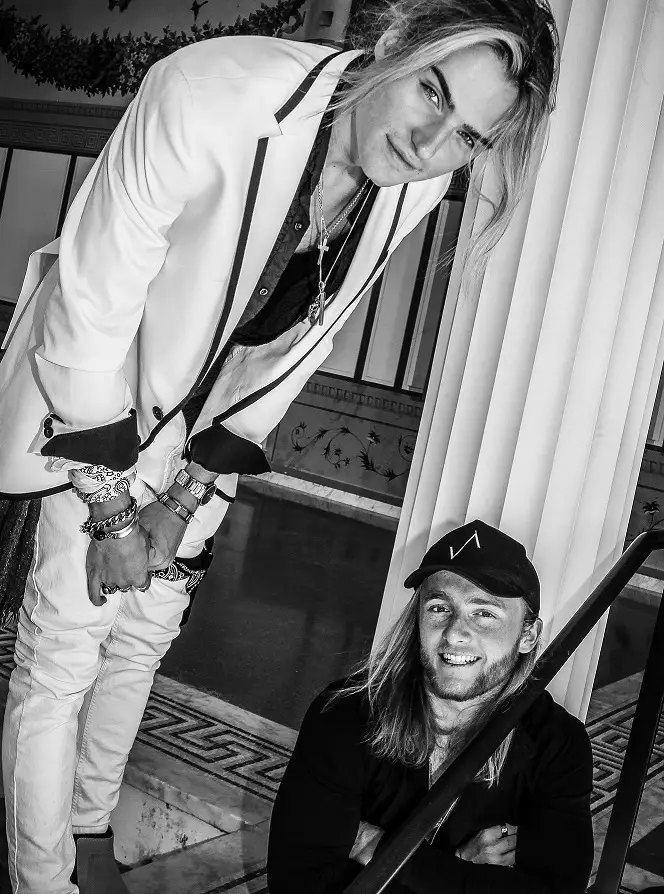
Interesting. So do you find this new direction to be easier than the electronic music?
Luke: I think it’s more appropriate. It’s a better way to emulate these stories.
Gus: So for me, the electronic music was also producing in the electronic world was what it’s all about. You could get music just from a laptop to be radio-friendly. You wouldn’t necessarily have to record that much. You could just do a remix. That’s how I started learning producing, through trying to make dance music. Dance music is very technically…you have to know what you’re doing in terms of production to get your tracks to stand out. For me, that’s harder than production. When we started the dance music thing, it was at a point when we could get our music to sound like we wanted it to sound. We wanted to get it to the point where it would compete against the songs we heard on the radio.
Luke: I think taking a lot of these production tools from dance music, now playing it being a band, I think Gus hit the nail on the head there.
So who are some of your biggest musical influences?
Gus: I’d say Twenty-One Pilots. Me being British, The 1975. I love those guys. Imagine Dragons. Coldplay. What about you?
Luke: For me, Fall Out Boy, Panic At the Disco, and Elliot Smith, the guy who got me into music. I think how he’s so open to talking about sadness is really inspiring to me. And then, 30 Seconds to Mars, Green Day, a lot of those guys with big songs that also have big lyrical influences. I was inspired as a songwriter by poetry and books, romantic novels like The Time Traveller’s Wife and Water for Elephants. Kind of coming from this romantic kind of band.
Very cool. So you'd say you draw influence from literature as well, not just other artists or real-life influence?
Luke: Yeah. What I love about music is songwriting. I was always into poetry growing up. I still am, reading and writing. I think music is just another form of poetry, or a book, really. It’s all storytelling in my opinion.
Oh, definitely. That's a really cool way to look at it.
Gus and Luke: Thanks, Kelly.
So do you draw any of your influence from real life experience, or would you say it's mostly fictional?
Gus: Most definitely. This album was kind of born out of heartbreak and personal demons we dealt with. Although the subject matter is sometimes negative and about parts of life that can be challenging, it’s this kind of somber courage we’re trying to put across in our music. Okay, you’re sad. This isn’t pleasant. If we embrace it, we tell the world this, maybe there will be people just like us who want to rejoice in this common ground and turn this heartbreak into pride. Embrace it, be proud of where you’ve come from, and sort of shout about it.
Is there a certain song on the album that feels the most emotional to you? Or the closest to your hearts?
Luke: For me, it’s “Beating.” The hook of it is “The heart was made to take a beating.” It was a part in my life where I dealt with some depression issues and things like that. I realized that I always wanted to hide that and be ashamed of it. Then I realized that your heart was meant to take a beating. You’re supposed to feel pain. It can then provide the contrast for the joy you feel in life. You’re able to see what the good moments are because you’ve been through these negative spots. For me, that song means a lot.
Gus: Also, another one called “Stand Tall,” which I think might be the next one to come out. That, for me, was born out of one of my best friends learning that his father wasn’t going to be around much longer. It was born out of that situation where a father-son relationship is put in jeopardy and you’re really analyzing how to move forward.
Luke: My father, last year, was diagnosed with stage 4 cancer.
Oh my gosh, I'm so sorry.
Luke: You know what, it’s actually not horrible. I think the real tragedy is a father watching his son die. I think all sons have to see their father go. It’s part of life. When Gus had this happen to him, it seemed like the perfect moment for us to get a lot of those feelings out. It ended up evolving into a song for anyone dealing with something they need to stand tall against, whether that’s depression or bullying or whatever mental and physical health. We’re both very proud of that song too.
So, Stand Tall is very stripped down.
Yeah, when we were showing that song around it was stripped back and we were getting emotional reactions right away. People were dealing with pain, and we realized when it was stripped back you’re able to really concentrate on the words and the vocal performance.
Definitely. I think it goes really well. The vibe of the song and the topic, it's very vulnerable altogether which is a cool thing. The other two songs that you've have released already are 'Hundredth Second Chance' and 'Lately.' Can you tell me a little about them? They share more of an upbeat, radio vibe.
Gus: “100th Second Chance” is more of an anthem. That tune was born out of a place of loners. We’re kind of both hopeless romantics. Our willingness to go full-fledged into situations and relationships and stuff often bites you in the ass. It’s that kind of situation where you’re looking at yourself and everything is kind of crumbling around you, but at the same time, it’s something you have to experience to realize the situation you’re in. You’ve found comfort in something which actually, you’re taking out of that situation. You’re looking at it objectively in a really messed up situation to be in. Once you realize that, you can be happy that you’re out.
Luke: I’d go with what Gus is saying. The phrase “Love is Blind.” “Hundredth Second Chance” is this realization that you’re in this messed up relationship but you’re so comfortable in it that you want to give it a go cause there’s still some sort of love there. You might even be in love with how horrible it is because you’re used to it. I think that’s what that song is about. And “Lately” is also a bit of an echo of that. It’s like humans, you’re feeling someone growing distant from you, but you’re kind of holding onto it because you’re in love with what it used to be. You’re in love with the idea of it, not with what it is.
What do you want listeners to gain from your music?
Luke: We wrote these songs for use because we felt we had to. It was a way for us to deal with pain and to think through a feeling. They belong to us, we held them tight as a remedy. But now, seeing how they’ve helped us, we want them to go out to others. We want to build an audience of people who wear their heart on their sleeve with the scars on it from where it was broken at one point.
— —
:: stream/purchase VOILÀ here ::
— — — —

Connect with VOILÀ on
Facebook, Instagram, Twitter
Discover new music on Atwood Magazine

